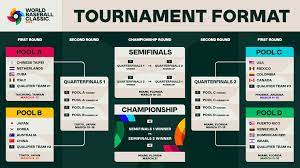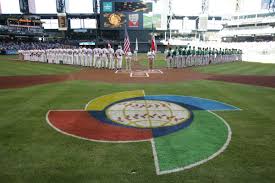Pool play in baseball is a unique format designed to reduce the number of games that need to be played during a tournament while still allowing teams to compete against opponents with similar records.
This approach saves time and promotes fair and enjoyable competition among participating teams.
Usually seen in tournaments such as the World Baseball Classic, pool play divides teams into various groups, wherein they all play a specified number of games against one another. After completing these games, the top-performing teams from each group advance to a single-elimination championship round, thereby streamlining the competition process.
With an increasing number of teams and a predetermined schedule format, pool play creates an organized and methodical approach to baseball competition.
This system benefits both players and fans alike by simplifying logistics, ensuring engaging matchups, and fostering an exciting atmosphere during crucial tournament events.
Contents
Understanding Pool Play
Definition and Structure
Pool play in baseball refers to a specific method of organizing games within a tournament or league. In this format, teams are divided into pools or groups and play a round-robin style competition, where each team faces all other teams in its pool once. The results of these games determine the standings for each team within their pool.
Typically, the top teams in each pool proceed to the next phase of the competition, such as quarterfinals or semifinals. In some cases, team standings may also determine seeding for the knockout stage or advancement to other pool play rounds.
Advantages and Disadvantages
There are several advantages of using the pool play format in baseball:
- Enhanced competition: It promotes competitive games since every match counts towards the standings within the pool.
- Better scheduling: Since the fixtures are predetermined, it allows for better scheduling for teams and spectators.
- Opportunities for all teams: Each team gets to play multiple games, regardless of their performance, which can be beneficial for development and experience.
However, there are also some disadvantages associated with pool play:
- Potential for ties: Since every team in a pool plays a limited number of games, it’s possible for the standings to result in ties, which may require tiebreakers to determine advancement or seeding.
- Uneven competition levels: Depending on the composition of each pool, some teams may face a more challenging or easier set of opponents, affecting their chances of advancing to the next round.
Pool Play in Baseball Tournaments
Pool play is a popular format for baseball tournaments, designed to ensure that teams get a minimum number of games while providing a fair and competitive experience.
Types of Tournaments
There are various types of tournaments that use pool play, ranging from youth leagues to international competitions such as the World Baseball Classic. Teams are divided into groups or “pools” where they play a round-robin style set of games against each other.
After the round-robin games, the tournament typically progresses into a playoff or knockout stage, involving only the top-performing teams from each pool. The exact format for advancement and knockout stages can vary depending on the specific tournament rules and size.
The complete pool play schedule! Which #WorldBaseballClassic game are you looking forward to most? pic.twitter.com/cMirfcHsF9
— World Baseball Classic (@WBCBaseball) March 7, 2023
Seeding and Advancement
In some tournaments, seeding is used to determine how teams are allocated into pools. Seeding can be based on factors such as team skill level, geographical location, or previous performance in similar tournaments. This can help to create a balanced competition and discourage lopsided pool play results.
Advancement to the knockout stage usually depends on a team’s performance within their pool. A common advancement method is for the top team or teams from each pool (based on win-loss record or specific tie-breaking criteria) to proceed to the playoff stage. For example, in the 2021 ACC Baseball Championship, a pool-play format led into a four-team, single-elimination bracket to determine the league champion.
Other formats, such as a crossover or “wild card” system, may be used to determine additional teams that advance to the playoffs. These results can add excitement and unpredictability to the tournament, keeping the competition engaging for both participants and spectators.
Common Baseball Pool Play Formats
There are different formats used in baseball pool play to organize and manage tournaments. This section will cover two common formats: Round Robin and Modified Elimination.
Round Robin
In a Round Robin format, each team plays every other team in its pool once. This ensures an equal number of games for all teams and allows for a fair comparison of their performances.
The win-loss records of the teams are used to determine their standings in the group, with the top teams advancing to the playoffs or knockout stages of the tournament.
For example, a pool with four teams would have a total of six games, as each team would play three games against its three opponents. The team with the best win-loss record advances to the next stage of the competition. In case of a tie, tiebreakers such as run differential or head-to-head results may be used to determine the final standings.
Modified Elimination
In a Modified Elimination format, a combination of pool play and elimination brackets is used.
Teams are initially divided into pools and play a round-robin or a similar group stage format to determine seedings for the elimination stage of the tournament.
During the elimination stage, teams are placed into a single or double-elimination bracket based on their performance in the pool play.
The format can vary, but the general idea is that a team needs to lose a certain number of games (usually one or two) in the elimination stage to be knocked out of the tournament.
Modified Elimination provides a balance between fairness (through pool play) and excitement (through elimination rounds), as teams have the opportunity to redeem themselves in the knockout stage even if they underperformed in the group stage.
Strategies for Success
Preparation
One key factor for success in pool play baseball games is preparation. Before the games begin, coaches should carefully analyze the strengths and weaknesses of their players and develop a game plan accordingly. This includes strategizing on the batting order, deciding which pitchers to start, and considering various defensive alignments depending on the situation and opposing team.
Coaches should also study their opponents to gain insights into their playing styles, key players, and potential vulnerabilities.
This knowledge can be leveraged to make informed decisions during games and exploit any weaknesses the opposing teams may have.
For example, if a team has a dominant pitcher, the batting lineup could be adjusted to include more left-handed hitters if the pitcher struggles against lefties.
Adaptation
Another essential element for success in pool play is the ability to adapt during games. As each game progresses, it’s important for coaches to remain vigilant and make in-game adjustments by closely monitoring the performance of their players and the strategies of the opposing team. This could include changing pitchers, experimenting with different batting orders, and employing new defensive alignments.
Utilizing a flexible approach, coaches should be prepared to alter their game plan if needed. For instance, if the opposing team is staging a comeback, a coach might choose to bring back their best pitcher, even if they had initially planned to rest them for future games (source). Additionally, coaches should educate their players on various baseball situations and strategies, such as bunting, stealing bases, and hit-and-run plays, so they’re ready to execute these tactics when necessary (source).
In summary, successful pool play baseball teams are built on a foundation of thorough preparation and the capacity to adapt on the fly. By understanding their players and opponents, and remaining flexible in their strategic approach, coaches can maximize their team’s chances of success in pool play and beyond.
Notable Examples and Case Studies
Youth Baseball
In youth baseball, pool play is often utilized in tournaments to ensure fair competition and equal playing opportunities for all participating teams. A notable example of this can be found in the Babe Ruth League, which offers different pool play formats based on the number of teams participating. These formats outline predetermined game matchups and schedules. Once all games in the pool play stage are completed, teams are often ranked based on their performance, and the top teams advance to the next round in the tournament.
International Competitions
International baseball competitions also commonly use pool play formats to determine qualification for the next stages of the event. One such example is the World Baseball Classic, where participating countries are initially divided into pools, playing a round-robin style competition within their pools. The best teams from each pool then advance to the next round of the competition.
Another instance where pool play is employed in international baseball competition is the Baseball Rules Academy. This platform offers expert analysis on unusual plays and disputed calls from both domestic and international baseball events. Case studies and video examples provide valuable insights into how complex baseball rules are applied in real-life situations during pool play games and other stages of tournaments.
Conclusion
Pool play in baseball is a format utilized in tournaments to streamline the number of games played and ensure that teams with similar records compete against each other. Dividing teams into groups, or pools, it applies a round-robin schedule where each team faces every other team in their respective pool.
This structure not only reduces the number of games but also promotes a competitive environment. It helps determine the top-performing teams and allows them to progress further into the tournament. Ultimately, this format benefits both participants and spectators by streamlining competition and creating exciting matchups.
As displayed in the 2023 World Baseball Classic, pool play, with its efficient and equitable approach, remains a popular choice for organizing high-level baseball competitions. By determining team standings and providing a method for ranking tournament performance, pool play continues to serve as an integral aspect of the modern baseball landscape.



